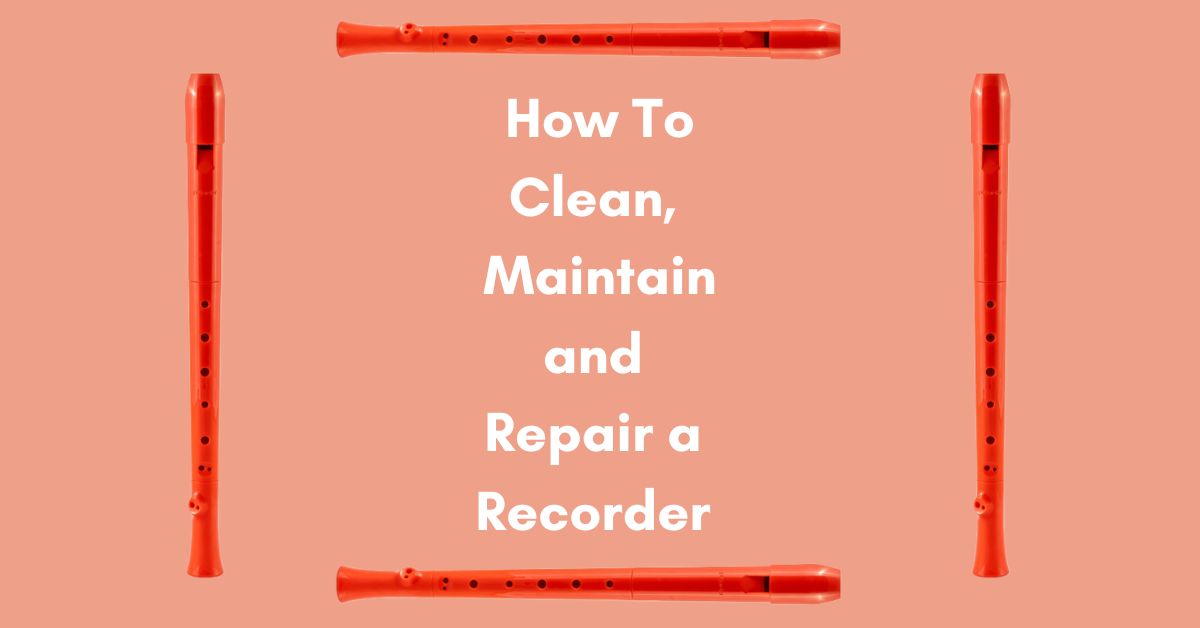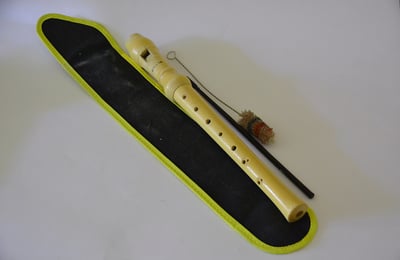How To Clean, Maintain and Repair a Recorder
May 29th, 2023
4 min read

Children break things. They drop, bump, scrape, smash, shatter and destroy.
This is part of their charm (or we tell ourselves it is through deep breaths).
Dropped your ice cream on the floor? Sigh, it's a mess and that tantrum wasn't fun, but nobody was hurt.
Knocked over a priceless antique vase? It's fine, it wasn't an antique, and anything of value has already been destroyed.
Taking care of things is difficult and some musical instruments can require lots of attention (especially when delicate ones crash to the floor). Recorders might seem like simple instruments, but accidents do happen. There are also lots of ways to keep your recorder in pristine condition that will keep it sounding smooth and sweet.
The pBone Music team have been there, done that, and got the superglue on our t-shirts. As parents, educators and musicians, we know that accidents can happen.
We also know that the maintenance of musical instruments is crucial for getting the most out of them. After all, looking after your instrument now could see it last a lifetime.
In this article, we will offer advice on the best ways to look after your recorder, whether it is made of plastic or wood. We will also discuss the ways you can keep it performing to its full potential. as well as what to do when repairs are required.
How to clean your recorder
Cleaning your recorder makes a lot of sense. After all, kids and germs can get on a little too well. Cleaning a plastic recorder can be as simple as wiping the outside of your instrument with some lukewarm soapy water. Be sure to use a non-abrasive cloth and avoid cleaning products that are too strong: a mild detergent will do the trick!
For more thorough cleaning, you can disassemble the recorder and clean the individual parts. For most plastic recorders, this can be a quick soak in some soapy water to flush out any debris. You can also wipe the joints and even use a cleaning brush to get inside those hard-to-reach places. Think of a small long brush that you would clean a water bottle with (or that you pretend to clean your water bottle with!)

The mouthpiece is an obvious area that you'll want to clean, but be careful not to damage this area by brushing or pressing too hard. Dry with a soft cloth, assemble your plastic recorder and you can worry about germs a little less.
(Of course, there is a recorder with anti-microbial technology which keeps germs at bay without cleaning.)
Cleaning a wooden recorder requires a more careful approach. Avoid using water, instead use a cloth with some detergent or a mild sterilising solution. Check out Dr Brian Blood's Complete Recorder Care Vol. 4 for more information on keeping your wooden recorder clean.
How to maintain your recorder
When you're not worrying about the junk and gunk that your recorder (and little learner) has been collecting, you will want to keep your instrument in good working order. Here are some top tips to keep it sounding fresh:
-
To prevent sticking and ensure a smooth sound, use a small amount of oil to lubricate the joints of the recorder.
-
Whether you have a plastic or a wooden recorder, moisture can cause damage! So store your instrument somewhere dry.
-
Like many other instruments, changes in temperature can spell trouble for your recorder. Live somewhere really hot? You lucky thing, but keep your recorder somewhere cool. If you live in Wales, try not to leave it out in the cold.
-
A protective case for your instrument will help to keep it clean. If only there was a recorder with sustainably designed packaging that doubled as a crafty case...
How to repair your recorder
So far, we've been able to take care of business ourselves. But repairs to wooden recorders will need to be carried out by a professional. These are handcrafted instruments and are often expensive, so be sure to get the best advice that you can. Contact the music shop or dealer where you purchased your instrument. If you are in the UK, check out the Society of Recorder Players for a list of recorder repair gurus.
Good-quality plastic recorders are made of tougher stuff and are less like to crack and break. ABS plastic will survive most day-to-day accidents, such as kids dropping their recorders to the floor. They will also survive general wear and tear, such as being stuffed inside a school bag, far better than a wooden recorder.
If your plastic recorder has broken and is beyond repair, ensure that your instrument is suitable for recycling. Some recorders can be recycled with your regular household plastics, but some may require specialist treatment. Ask the retailer where you purchased your instrument as they should be able to help get your recorder recycled.
A recorder that lasts can create a lasting impact on your child
Encouraging your child to take good care of their recorder could be the start of their musical pathway. These beginner instruments could kickstart a new hobby or improve your child's concentration. It could even be the first notes played by a future musical maestro.
But as important as learning to play an instrument can be, taking care of it teaches other good habits for children. It fosters responsibility and gives kids a sense of ownership. And it has the added bonus of saving you endless trips to the store and the cost involved.
A quality recorder will stand the test of time, but making sure that you clean your recorder and treat it well could it see it become a family heirloom. Who needs an antique vase when you can have a recorder that has seen it all?
- There are wooden and plastic recorders, but besides what they're made of, what makes them so different? Read our article and explore for yourself!
- Did you know there are more than five types of recorders? Well get learning and find out which one suits your needs in our article on best beginner recorders.
- Want to know why we're suddenly talking all things recorder? We might just have a new instrument about to be unveiled. Read on to learn more about pCorder.
Adam is the Content Manager at pBone Music. This should mean that he’s the ideal person to write about himself, but he finds boasting in the third person a little awkward. He honed his word wizardry with a degree in English Language and Literature at the University of Leeds. He has since written copy for clients and businesses across the land, from awards to something beginning with “z”. He also spent a number of years as a musician. He has written pop songs and even jingles for kids, performed more first dances at weddings than you could shake a pBuzz at, and once played a gig for a pie company at The Etihad Stadium in Manchester. When he’s not reminiscing about those good old days, you might find Adam enjoying the football (although as an Everton fan, that can be difficult). He also loves spending time with his partner, Jen, and his family and friends, and sincerely hopes they feel the same way.